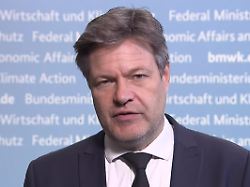Habeck on the Growth Opportunities Act
“The Union is really a problem”
February 21, 2024, 6:25 p.m
This evening the Growth Opportunities Act is the topic of the Mediation Committee. The states have so far blocked the traffic light project. The Union is also taking a stand – which Economics Minister Habeck sharply criticized in an interview. “She demands a lot and doesn’t back it up with numbers,” he tells RTL/ntv.
Federal Minister of Economics Robert Habeck was annoyed by the Union’s behavior during the negotiations on the Growth Opportunities Act. “The Union is really a problem, I have to say that. It demands a lot, doesn’t back it up with numbers. And it discounts what it has on the table because it doesn’t want to provide the money,” said the Green Party leader. Politician RTL/ntv. Then the Union refuses to conclude the deal. “This is not consistent in any respect. It’s not that the traffic lights always do everything right – but that is dubious,” said the Vice Chancellor.
Habeck admitted that the Growth Opportunities Act was small, “and then it became even smaller through negotiations with the states, and now the Union is holding on to it.” “We should do what we can do. I’m a bit at a loss when it comes to the Union,” Habeck continued.
With the Growth Opportunities Act, the traffic light wants to provide tax relief for companies. However, the states are blocking the law because of expected loss of revenue. On Wednesday evening, the mediation committee of the Bundestag and Bundesrat is looking for a compromise solution.
Traffic lights will “hopefully be a little quieter”
“The factors that have delayed the upswing are primarily external factors,” said Habeck, referring to the annual economic report presented today. “World trade is historically bad, we see it every evening on the news: crises and wars everywhere, protectionism is spreading. That is of course bad for a trading country like Germany.” Trust is the elixir in the economy and the federal government has made “a lot of very far-reaching, very good” decisions, “but the noise level around it was pretty loud.” The government has “not exactly strengthened” the confidence of the economy. The coalition will do better in the future: the next decisions that need to be made will “hopefully be a little quieter”.
When asked about necessary investments in view of the currently weak economy, Habeck said that the traffic light made up of the SPD, Greens and FDP were sticking to the rules agreed in the coalition agreement and that there was no political majority to change the debt brake. “I make no secret of the fact that I am of the opinion that the debt brake was written for a different time.” The military conflicts, the spending on the arms industry, the decarbonization of the economy, the competitive situation in Germany would require new reflection on “whether our financial policy play is still correct.”
The investments of the state, i.e. the states and the federal government, are “at a very, very high level,” said Habeck. “More would be desirable, especially perhaps in the military sector at the moment, but these are state investments the likes of which we haven’t seen since the 1990s.” It is not the case that the government is doing nothing.
Harsh sanctions for total objectors
In the debate about a lack of workers, Habeck pointed out the numerous possible sanctions for citizens’ benefit recipients who are unwilling to work. “Those who completely refuse to work and are perfectly healthy and simply say: I don’t want to – they can end up being sanctioned very harshly, up to and including total withdrawal of benefits.”
However, Habeck sees another problem as the so-called transfer withdrawal rate, i.e. the percentage that recipients of citizen’s money have to give up of their additional wages. “It’s very high at 80 percent, sometimes even higher, so it’s basically not worth working on top of that.” If the rate were made more generous, people would have an incentive to work and thus an incentive to perhaps enter the regular job market, says Habeck. “We’re talking about that now, I’m very much in favor of changing and weakening this transfer withdrawal rate,” said the Economics Minister.
